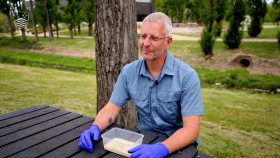Beating malaria: All guns to bear
At a clinic in the western part of Cambodia, a young mother is given the malaria drug Artemisinin. After six days of treatment, the parasite has been cleared from her blood and she is back at home, helping the kids off to school again. But it should have been three days. "It's a worrying sign," says Professor Kiaran Kirk, leader of a malaria research department at the ANU Research School of Biology. "Artemisinin is our last effective malaria drug but in parts of south-east Asia it's taking longer to work than it used to. Its the first sign that the malaria parasite is becoming resistant." Artemisinin was developed from a Chinese herbal medicine during the Vietnam War. It's had a few decades of fighting the disease but, as with all its predecessors, it seems set to lose the battle as the malaria parasite undergoes mutations that reduce the effectiveness of this killer treatment.
More than 500,000 people die of malaria ever; year and 40 per cent of the world's population is at risk of contracting the disease. Although it is such a threat, funding for research into finding a cure pales in comparison to that for cancers and heart disease, says Kirk.
"Pharmaceutical companies have the best funded labs in the world but they are conspicuously absent from malaria research. There is little profit to be made from antimalarials. So it falls largely to universities and research institutes to do the research." Kirk, Dean of the ANU College of Medicine, Biology and the Environment, and his colleagues have built a thriving malaria research community of more than 40 academics spread throughout multiple Schools in the College. Many of the researchers meet on a weekly basis to share ideas and techniques.
"I moved to malaria research because of the community of parasitologists," says Biology PhD candidate Adelaide Dennis. The community shares a goal of making a difference to the world. Dennis dreams of discovering a drug, taking it through clinical trials and then becoming a doctor so she can take the drug all the way to patients. However, it's not just altruism that attracts researchers to the field.
"The third year parasitology course at ANU was great," Dennis says.
"Parasites, despite being disgusting, are amazing physiologically. Malaria is one of the most complex single-celled organisms.
"As a biologist, that was just too interesting not to follow up."
The University's army of malaria researchers are attacking the parasite from all angles, hoping to identify essential molecular mechanisms that can be disrupted with new and much needed antimalarial drugs.
Kirk's group studies how salt is pumped out of the parasite, a process that is targeted by the current front-runner for a new class of antimalarial drugs.
Director of John Curtin School of Medical Research Professor Simon Foote also works on malaria and believes a millennia-long experiment may be the key to winning the war.
"If we target a parasite's processes, it may take just one mutation for the parasite to get around the drug," he says.
"But there are some humans who are genetically resistant to malaria and in tens of thousands of years malaria hasn't got around it. It's a very successful natural experiment."
Foote's battle plan is to explore the human mutations and mimic them with new drugs.
Professor Foote has already taken one drug through clinical trials, only to see it fall at the last hurdle. However, there are others in the pipeline and he is confident his growing team will produce success.
The war on parasites is also being waged from the weatherboard warren of buildings that make up the Research School of Population Health (RSPH).
The charm of the surroundings belies the Star Wars nature of RSPH Director Professor Archie Clements' weaponry. His work uses satellites to track parasites.
He has pioneered a method to combine satellite data such as temperature, rainfall, vegetation and land usage with health data in a geographical information system.
"Some diseases are highly sensitive to their environment, especially parasitic diseases. With remote sensing you can identify places where disease flourishes," Clements says. Although the approach is a world away from the medical researchers next door, Clements says the philosophy is the same.
“We have the opportunity to have a meaningful impact on the real world and save a lot of loves” he says.
Source: ANU Reporter, Winter 2015. By Dr Phil Dooley, BSc (Hons) ’90, PhD ‘99











